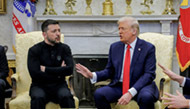The contradictory approaches have startled some of America’s allies. Even White House officials were at pains to explain why Saudi forces rolling into Bahrain merited a mild news release, but Muammar el-Qaddafi’s forces in Libya were bombed. “Pragmatism is a great thing,” a senior aide to Mr. Obama said over lunch in April. “But somewhere in all this we have to lay out some principles.”
On May 19, Mr. Obama tried to do just that - arguing that he is now ready to assert traditional American values as the “top priority” of American foreign policy.
Even in the hardest cases, he said in a speech at the State Department, “there must be no doubt that the United States of America welcomes change that advances self-determination and opportunity.”
He added: “After decades of accepting the world as it is in the region, we have a chance to pursue the world as it should be.”
It was lofty stuff, echoing George W. Bush, whose call for America to fight for individual liberty worldwide was rejected in much of the world as a rationale for the invasion of Iraq.
So which American president is Obama going to be? The hard-headed pragmatist who bombed Benghazi to prevent a massacre and then violated Pakistan’s sovereignty to kill Osama bin Laden? Or the former law professor who has now promised 400 million people that “if you take the risks that reform entails, you will have the full support of the United States”?
“This is only part of a doctrine,” said Vali Nasr, who left the State Department recently . “It explains the ideal, but he has to couple it with an implementation,” he said. “In the end, the president is going to have to hold Bahrain to the same standard as Libya or Syria.”
Mr. Obama’s bet is that half a doctrine is all he needs right now, at a moment when American policy needs coherence, even as he insists a consistent set of tactics is impossible.
Many Arabs have labeled him an opportunist who used some uprisings to his advantage, and ignored them when they threatened to interfere with oil markets or upend America’s strategy to contain Iran.
“It was necessary for him to step back and say that not only does he support the aspirations of the people we have seen in the streets, but supporting them is in our long-term interest,” said Benjamin J. Rhodes, a deputy national security adviser.
After Mr. Obama’s speech, every future action is bound to be scrutinized.
If the royal family in Bahrain continues to listen to neighboring Saudi Arabia ? which sent troops into Bahrain ? does the president split with the Saudis?
That seems highly unlikely, with a growing threat from Iran.
If the newly empowered Egyptians give an opening to the Muslim Brotherhood, and threaten Egypt’s peace accord with Israel, does the president go forward with his promise of debt relief and loans?
“We think there’s a ‘Muslim Brotherhood exception’ to the aid package,” an Obama strategist said.
In talks with Mr. Obama’s staff, it was clear he believes that by embracing a long-term goal of self-determination, he is allowing himself room to maneuver.
“There will be times when our shortterm interests don’t align perfectly with our long-term vision,” he said in the speech, without suggesting how he would handle those conflicts.
In his first two years in office, Mr. Obama said little about democratic transformations as a core goal.
“The last decade was defined by Bin Laden and the war in Iraq,” Mr. Rhodes said. “The fact that the war is winding down and Bin Laden is gone creates an opportunity.”
But even seemingly democratic revolutions create power vacuums, and the governments that arise can be unpredictable.
Egypt’s popular uprising may produce an elected government subservient to the military. And the Bush administration pressed for elections in the Palestinian territories and was astounded when Hamas won.
Mr. Obama clearly has faith that showering Egypt and Tunisia with aid and offering to integrate them into Western economies will create a powerful example for other states. But Saudi Arabia and Israel believe that strong authoritarians in the region are better than weak democrats.
That is the new doctrinal struggle as the Arab Spring slips into a long, hot summer.
By DAVID E. SANGER
WASHINGTON
스마터리빙
more [ 건강]
[ 건강]이제 혈관 건강도 챙기자!
[현대해운]우리 눈에 보이지 않기 때문에 혈관 건강을 챙기는 것은 결코 쉽지 않은데요. 여러분은 혈관 건강을 유지하기 위해 어떤 노력을 하시나요?
 [ 건강]
[ 건강]내 몸이 건강해지는 과일궁합
 [ 라이프]
[ 라이프]벌레야 물럿거라! 천연 해충제 만들기
 [ 건강]
[ 건강]혈압 낮추는데 좋은 식품
[현대해운]혈관 건강은 주로 노화가 진행되면서 지켜야 할 문제라고 인식되어 왔습니다. 최근 생활 패턴과 식생활의 변화로 혈관의 노화 진행이 빨라지고
사람·사람들
more많이 본 기사
- 한화 “필리조선소서 미군 핵잠 건조하기 위한 준비 착수”
- 백악관, 군에 “베네수엘라 원유 격리하라” 총력 지시
- 트럼프, 李대통령에 ‘백악관 황금열쇠’ 선물… “최고의 협력관계”
- 서태지, 딸·엘리와 1년 만에 근황 “좋은 소식 없어 안타까워”
- 北 “신형장거리대공미사일 동해상 시험발사”…김정은 참관
- 서유리, ♥법조계 남친 데이트 신청에 두근.. “돈은 내가 낸다”
- 조지아 역주행 사고, 한인 남편 이어 임신 아내·태아 사망
- 로비 단서 혹은 과대포장?…3천쪽 통일교 내부문건 살펴보니
- 지민의 크리스마스 선물, 친필 트리 그림과 귀여움 폭발 셀카…새 인스타 단장
- [‘로드 레이지’ 한인 피살 현장 상세 상황] 끼어들기 시비가 비극으로… 차에서 내려 “쏴봐라” 언쟁
- 성탄 전날 LA 일대 폭풍우…돌발 홍수·산사태 경보
- [성탄절 문 여는 곳은] 코스코·월마트 닫고… CVS는 영업
- 온라인쇼핑과 반품, 그리고 그 이후 1
- 국방부 “中, 美 안보 위협할 군사력 보유…본토 갈수록 취약”
- ‘16kg 감량’ 홍현희, 다이어트 비결 뭐길래..날렵해진 턱 라인
- 산타 한반도 다녀가셨네…성탄절 밤하늘 제주-서울 돌고 평양행
- 테슬라 ‘비상시 차문 안열리는’ 문제… 1
- [미국은 지금] MAGA의 분열, 예… 3
- ‘계엄연루’ 추경호 첫재판…특검 “국민관심 커 신속재판해야”
- 경찰, ‘마약혐의’ 황하나 영장신청 예정…도피 중 범행도 수사
- 박나래, 과거 또 파묘..이번엔 ‘나혼산’ 18L 식용유 장면
- 위성락 “’핵잠’ 韓美협정 추진키로 … 1
- 순회영사팀과 한인회 봉사자들 송년 오찬
- [미라클터치] “겨울철 건강 회복, 뼈에서 시작된다”
- “청소년 성별확정치료 중단 안돼”…19개주, 정부 상대 소송
- “올 한해 동안 너무 감사했어요”
- 한인 박찬영씨 총격살해범은 백인 군인...살해범 “박씨 차량이 끼어들어 시비가 붙어 결국 총쐈다”
- 美 경제 3분기 4.3% ‘깜짝 성장’…강한 소비가 성장견인
- 해외서도 극과극 반응’대홍수’, 넷플릭스 글로벌 1위 차지”SF 걸작 vs 최악”
- 연방대법, 시카고 주방위군 투입 ‘기각’
- [수요 에세이] 삶이라는 배를 타고
- “은·로빈후드·인공지능 주식에 집중 투자”
- “트럼프특사, 벨라루스 정상과의 협상수단으로 살빼는약 동원”
- 팀 쿡 애플 CEO, 나이키 주식 43억원어치 매입…나이키 주가↑
- H-1B비자 고임금·경력자에 우선권
- 美, 물류거점창고에 불체자 8만명 수용 추진… ‘아마존택배’ 방식
- “ATM기 사용하기 겁나네”
- 뉴욕증시, 성탄절 앞두고 상승 마감…S&P500 연일 사상최고치
- ‘이정후 위엄’ SF CEO+사장+단장+감독→韓 총출동! 황재균·윌리 아다메스까지 선행 참여
- 함소원, 진화와 한 지붕 이혼 부부..결국 눈물 “헤어지는 게 힘들어”
- 기부 줄이는 미국인들…트럼프·고물가·탈종교 3중 한파
- ‘평양무인기’ 김용현·여인형 추가 구속…법원 “증거인멸 염려”
- ‘파워볼’ 열풍 계속… 오늘 잭팟상금 17억 달러
- ‘글루텐 불내증’ 셰프가 빵집을? 고객 향한 온기 담은 바게트
- 먹는 비만약 경쟁 치열 ‘위고비’ 미국 판매승인
- 구은희 한국어교육재단 이사장 이천시 담당 부회장으로 임명
- 트럼프의 새 독트린 “미국을 다시 왜소하게”
- 미국 경제, 3분기 4.3% ‘깜짝 성장’
- 탁 트인 전망과 불꽃놀이로 즐기는 PALMS CASINO RESORT의 올인클루시브 2026 새해 맞이
- [남가주 6개 은행 전국 예금 현황] 1억달러 이상 예금고 지점 99개
1/5지식톡

-
 미 육군 사관학교 West Poin…
0
미 육군 사관학교 West Poin…
0https://youtu.be/SxD8cEhNV6Q연락처:wpkapca@gmail.comJohn Choi: 714-716-6414West Point 합격증을 받으셨나요?미 육군사관학교 West Point 학부모 모…
-
 ☝️해외에서도 가능한 한국어 선생님…
0
☝️해외에서도 가능한 한국어 선생님…
0이 영상 하나면 충분합니다!♥️상담신청문의♥️☝️ 문의 폭주로 '선착순 상담'만 진행합니다.☎️ : 02-6213-9094✨카카오톡ID : @GOODEDU77 (@골뱅이 꼭 붙여주셔야합니다…
-
 테슬라 자동차 시트커버 장착
0
테슬라 자동차 시트커버 장착
0테슬라 시트커버, 사놓고 아직 못 씌우셨죠?장착이 생각보다 쉽지 않습니다.20년 경력 전문가에게 맡기세요 — 깔끔하고 딱 맞게 장착해드립니다!장착비용:앞좌석: $40뒷좌석: $60앞·뒷좌석 …
-
 식당용 부탄가스
0
식당용 부탄가스
0식당용 부탄가스 홀세일 합니다 로스앤젤레스 다운타운 픽업 가능 안녕 하세요?강아지 & 고양이 모든 애완동물 / 반려동물 식품 & 모든 애완동물/반려동물 관련 제품들 전문적으로 홀세일/취급하는 회사 입니다 100% …
-
 ACSL 국제 컴퓨터 과학 대회, …
0
ACSL 국제 컴퓨터 과학 대회, …
0웹사이트 : www.eduspot.co.kr 카카오톡 상담하기 : https://pf.kakao.com/_BEQWxb블로그 : https://blog.naver.com/eduspotmain안녕하세요, 에듀스팟입니다…
케이타운 1번가
오피니언
 정숙희 논설위원
정숙희 논설위원온라인쇼핑과 반품, 그리고 그 이후
 파리드 자카리아 / 워싱턴포스트 칼럼니스트 / CNN ‘GPS’ 호스트
파리드 자카리아 / 워싱턴포스트 칼럼니스트 / CNN ‘GPS’ 호스트 트럼프의 새 독트린 “미국을 다시 왜소하게”
 김동찬 시민참여센터 대표
김동찬 시민참여센터 대표 [미국은 지금] MAGA의 분열, 예견된 균열의 시작
 임지영 (주)즐거운 예감 한점 갤러리 대표
임지영 (주)즐거운 예감 한점 갤러리 대표 [수요 에세이] 삶이라는 배를 타고
 이영창 / 한국일보 기자
이영창 / 한국일보 기자[지평선] ‘인간GPT’ 환각의 부작용
 조환동 / 편집기획국장·경제부장
조환동 / 편집기획국장·경제부장 AI로 가속화되는 노동시장 개편
 민경훈 논설위원
민경훈 논설위원‘크리스마스 캐롤’과 산타 클로스
 정재민 KAIST 문술미래전략 대학원 교수
정재민 KAIST 문술미래전략 대학원 교수 [정재민의 미디어풍경] 적과의 동침, 협력하며 경쟁하기
 김영화 수필가
김영화 수필가 [화요칼럼] 단호박의 온기
1/3지사별 뉴스

“온 세상에 평화를⋯”
숨가쁘게 달려온 2025년을 이제 1주일 남짓 남긴 채 크리스마스 이브를 맞는다. 다사다난했던 한 해를 되돌아보며 마무리하는 연말 시즌과 크리…
H-1B비자 고임금·경력자에 우선권

‘올해는 ICE 이민자 체포 광풍의 해’
올 한해동안 버지니아와 메릴랜드, DC 등에서 연방 이민당국에 체포된 사람이 1만명이 훌쩍 넘는 것으로 조사됐다. 또 미 전국적으로는 22만명…
“ATM기 사용하기 겁나네”

연말 ‘로드레이지’ 비극… 한인 총격 피살
연말을 맞아 도로 위에서 순간적으로 벌어진 운전 중 시비가 40대 한인 가장의 총격 피살 비극으로 이어졌다. 워싱턴주 레이시 경찰국과 서스턴 …
[‘로드 레이지’ 한인 피살 현장 상세 상황] 끼어들기 시비가 비극으로… 차에서 내려 “쏴봐라” 언쟁

오늘 하루 이 창 열지 않음 닫기 





















































.png)


댓글 안에 당신의 성숙함도 담아 주세요.
'오늘의 한마디'는 기사에 대하여 자신의 생각을 말하고 남의 생각을 들으며 서로 다양한 의견을 나누는 공간입니다. 그러나 간혹 불건전한 내용을 올리시는 분들이 계셔서 건전한 인터넷문화 정착을 위해 아래와 같은 운영원칙을 적용합니다.
자체 모니터링을 통해 아래에 해당하는 내용이 포함된 댓글이 발견되면 예고없이 삭제 조치를 하겠습니다.
불건전한 댓글을 올리거나, 이름에 비속어 및 상대방의 불쾌감을 주는 단어를 사용, 유명인 또는 특정 일반인을 사칭하는 경우 이용에 대한 차단 제재를 받을 수 있습니다. 차단될 경우, 일주일간 댓글을 달수 없게 됩니다.
명예훼손, 개인정보 유출, 욕설 등 법률에 위반되는 댓글은 관계 법령에 의거 민형사상 처벌을 받을 수 있으니 이용에 주의를 부탁드립니다.
Close
x